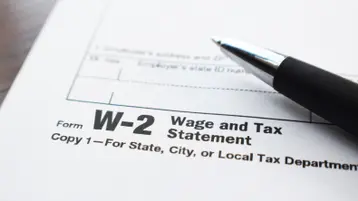
Table of contents
- 1.What are the FLSA provisions?
- 2.What makes a position exempt?
- 3.The salary level test
- 4.The salary basis test
- 5.The duties test
- 6.Executive exemption
- 7.Professional exemption
- 8.Outside sales exemption
- 9.Computer-related
- 10.Administrative exemption
- 11.What are the rights of exempt vs. nonexempt employees?
- 12.How many hours can a salaried exempt employee be forced to work?
If you’re a new employer or you’re creating a new job position in your organization, you might be wondering how to categorize employees’ salary status. Let’s take a look at what it means to be a salary exempt employee and the differences between a nonexempt and an exempt employee. Exempt or nonexempt employees: What’s the difference? The terms “salary exempt employees” and “nonexempt employees” come from the Fair Labor Standards Act (FLSA). In short, nonexempt employees are covered by provisions in the FLSA, and exempt employees are not covered.
What are the FLSA provisions?
Most jobs in the U.S. are governed by the FLSA. This federal law establishes the minimum wage, overtime pay eligibility, record keeping, and youth employment standards. It impacts employees in the federal, state, and local governments and in the private sector. Nonexempt employees are covered by the FLSA and are entitled to the following workplace rights:
- Minimum wage: Not less than $7.25 per hour, which is the federal minimum wage. In states where the state minimum wage is higher than the federal rate, the state minimum wage is used to determine FLSA entitlements.
- Overtime pay eligibility: Overtime wage for hours worked in excess of 40 in a workweek at not less than 1.5 times the employee’s regular rate of pay. The FLSA does not set a maximum limit on the overtime hours employers can require their employees to work. Therefore, employers can implement mandatory overtime at their discretion as long as employees are paid overtime compensation in accordance with the law.
Record keeping: Accurate and detailed attendance and payroll records of hours worked and wages paid by their employers.
For minors, restrictions exist regarding types of work they can perform, how many hours a day and week they may work, and other health and safety-related standards.
What makes a position exempt?
An exempt employee is not entitled to the rights outlined in the Fair Labor Standards Act. To be classified as exempt, the employee must meet all 3 of the following tests:
The salary level test
According to the FLSA, a U.S. employee must be paid a minimum of $35,568 per year ($684 per week) to qualify for the exempt category. However, some states have higher minimum amounts, which they set based on a multiple of their minimum wage.
For example, the State of Washington has a statewide minimum hourly workers’ wage of $15.74 per hour. So the minimum gross annual salary an exempt employee must be paid there is $65,484.
The salary basis test
Besides the minimum salary amount, all exempt employees must be paid on a salary basis. This means they must receive a guaranteed minimum salary from their employer each week regardless of the number of hours they work, as long as they work some hours.
However, the employee’s entire salary does not have to be guaranteed for them to be exempt. For example, a salesperson might earn a guaranteed “base” salary and commissions based on sales performance. The salesperson would still be considered exempt if the employer consistently pays the same base salary.
On the other hand, hourly employees who earn a different amount of money for work time depending on how many hours they work are not exempt.
As an employer, paying your employees on a salary basis generally means keeping the base salary you pay constant. That’s the case regardless of the quality or quantity of their work.
So, you will still need to pay a full salary if an employee performs less work than usual because of a reason that is under your control, such as a slow business month or a temporary business closure.
There are, however, a few exceptions to this rule:
- If you suspend an exempt employee for disciplinary reasons, you can implement a pay deduction in full-day increments. (You may never deduct a partial day of pay.)
- If your organization has a legitimate sick leave plan, and your exempt employee has run out of sick leave, you may let them miss full work days without pay when they are sick.
- In all circumstances, you may require exempt employees to use accrued leave when absent from work.
The duties test
Perhaps you have an employee to whom you pay more than the minimum salary required for an exempt employee in your state, and you pay on a salary basis. That employee might be exempt, but only if their responsibilities are “exempt duties.”
The FLSA includes these 5 job duties as exempt:
- Executive.
- Professional.
- Outside sales.
- Computer-related.
- Administrative.
Executive exemption
Here are the requirements for executive exempt job duties:
- The employee must be responsible for supervising at least 2 other full-time employees. (Or as many part-time employees as it would take to equal 2 full-time equivalent employees). These must be actual employees, not volunteers or interns. Supervision must also be a regular part of the exempt worker’s job.
- The primary duty of their position must be management. In other words, you can’t just give your janitor 2 more janitors to supervise and call him a manager if he’s not performing management duties. Management duties can include interviewing and training new employees, maintaining records, handling employee grievances, planning the work of a particular department, assigning work, planning budgets, and other managerial tasks.
- The exempt executive employee must have some genuine input into job status decisions, such as hiring, firing, promotions, or assignments. This doesn’t mean that the employee has to be the final decision-maker. You might have a management team that weighs in and a CEO who makes the final decision, for example. But for an employee to be considered to be performing exempt executive duties, you have to give their opinion some weight. It has to matter, and it has to be a part of their job responsibilities.
Professional exemption
The FLSA refers to people performing exempt professional job duties as part of the “learned professions.” It means that the work they perform is intellectual and requires specialized education.
It also means that the job depends upon the professional to exercise sound judgment and make determinations based on their expertise.
In general, the following jobs are considered exempt professional employees:
- Lawyers.
- Doctors, dentists, pharmacists, registered nurses (but not LPNs); licensed social workers, psychologists, and other mental health professionals performing clinical work.
- Teachers and clergy.
- Scientists, architects and licensed professional engineers.
- Actuaries and accountants (but not bookkeepers)
- Other employees whose jobs require “advanced knowledge.”
Outside sales exemption
According to the FLSA, an employee qualifies for the outside sales exemption if they meet the following criteria:
- Their primary duty is making sales or obtaining orders for goods or services.
- They typically perform their primary duty away from the employer’s business premises.
The FLSA also considers work incidental to or furthering an outside sales employee’s sales effort as exempt work. This could include writing sales reports, attending sales conferences, planning itineraries, managing promotional activities, and other ancillary duties.
A contentious issue among many employers is whether drivers involved in sales can be considered exempt employees.
Drivers may be exempt only if they have a primary duty of making sales. In this case, the loading, driving, and delivering will be regarded as exempt work because they are incidental to the employee’s outside sales or solicitations.
Computer-related
The term “computer-related” in FLSA exemptions does not include every employee interacting with a computer in the workplace. Instead, the FLSA sets separate requirementsthat must make up a significant portion of an employee’s job for them to be exempted.
An exempt computer professional’s primary duty must involve working on or with computers beyond simply using them. Below are some of the job duties that would qualify as exempt computer-related work:
- System analysis, including consulting with users to make informed decisions about hardware or software options.
- Design, development, testing, modification, and documentation of computer systems or computer programs based on user, system, or machine operating specifications.
Administrative exemption
This is the category that’s the trickiest to define. Basically, an administrative-exempt employee is someone who “keeps the business running.” Think of administrative employees as those who provide support to the operational workers. For example: human resources employees, payroll administration managers, and the staff who manage your records, accounting, public relations, budgeting, and marketing.
According to FLSA regulations, exempt administrative work job duties must:
- Be office or non-manual work.
- Be directly related to management or general business operations.
- Primarily involve the exercise of independent judgment about significant things.
In other words, these are not clerical or secretarial employees. To be considered administratively exempt, the employee must be allowed to make important decisions as a regular part of their job.
What are the rights of exempt vs. nonexempt employees?
Nonexempt employees have rights under the FLSA, including the right to be paid minimum wage and receive overtime pay. But exempt employees do not have those rights. The only real “right” that the exempt employee has under the FLSA is to be paid their guaranteed minimum salary every week they perform some work.
However, this doesn’t mean exempt workers have no rights. They are only exempt from FLSA protections, not all worker protection laws.
Regardless of exempt status, every salaried employee has the right to a safe and healthy work environment, equal employment opportunities and nondiscrimination, and the rights provided under the Family and Medical Leave Act.
And like all employers, you are still bound by child labor laws regardless of your employees’ exempt status.
How many hours can a salaried exempt employee be forced to work?
Most employers expect their exempt employees to work the number of hours necessary to get their jobs done. It doesn’t matter if that takes more or fewer than 40 hours per week. Even if your exempt employee works 70 hours a week, you are still only required to pay them their standard base salary.
However, just because employment laws can't prohibit you from requiring an exempt employee to work more than 40 hours a week doesn’t mean it’s a good idea. If you have an employee who regularly puts in extra hours just to get the minimum amount of work done, you might want to reconsider your expectations.
If the job is impossible to get done in about 40 hours a week, you’re likely looking at increased rates of employee burnout and turnover. It'll help to provide support for a healthier work-life balance going forward.
This article has been updated.

Nicole Roder
Table of contents
- 1.What are the FLSA provisions?
- 2.What makes a position exempt?
- 3.The salary level test
- 4.The salary basis test
- 5.The duties test
- 6.Executive exemption
- 7.Professional exemption
- 8.Outside sales exemption
- 9.Computer-related
- 10.Administrative exemption
- 11.What are the rights of exempt vs. nonexempt employees?
- 12.How many hours can a salaried exempt employee be forced to work?






